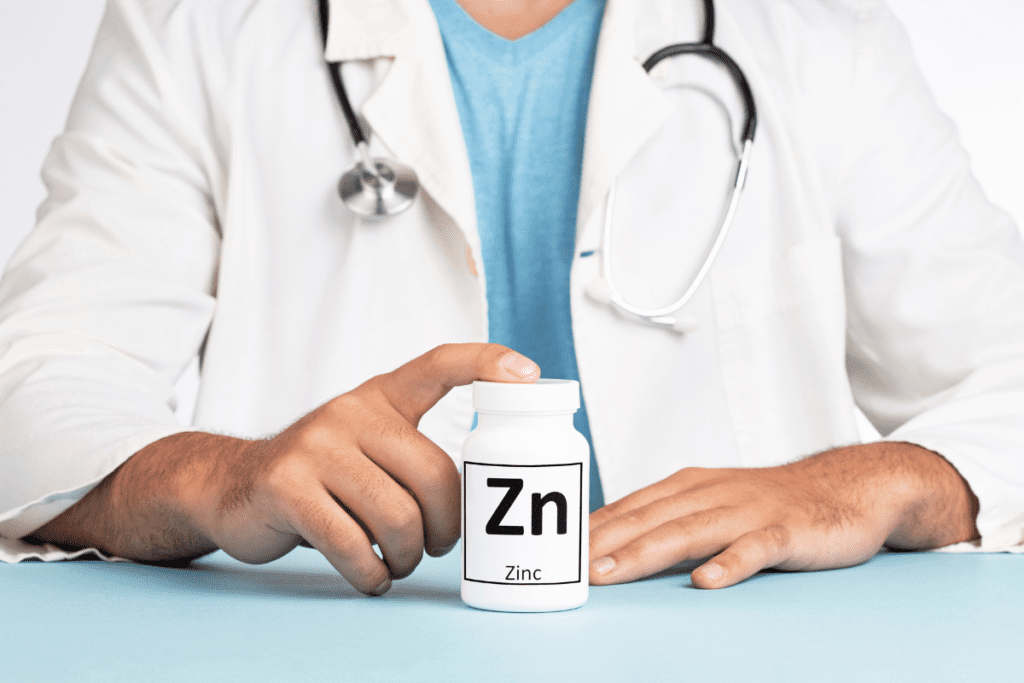
Probiotics, Prebiotics, and Women’s Hormonal Health: The Triad of Gut Balance
Probiotics, Prebiotics, and Women’s Hormonal Health: The Triad of Gut Balance When it comes to women’s health, hormonal balance plays a pivotal role. From regulating
In today’s health-conscious world, the significance of certain minerals and their impact on our body is gaining prominence. One such mineral, which often doesn’t get the limelight it deserves, is zinc. While zinc plays a myriad of roles in maintaining overall well-being, it is particularly vital for men’s reproductive health. In this blog post, we’ll delve deep into the vital role zinc plays in the male reproductive system and why it’s essential for optimum sexual health.

1. Understanding Zinc: A Brief Overview
Zinc is an essential trace mineral present in every cell of our body. It plays a role in immune function, protein synthesis, wound healing, and DNA synthesis. The recommended daily intake for men is 11 mg with an upper limit set to 40 mg per day. Interestingly, the highest concentration of zinc in men is found in the prostate gland and semen.
2. Zinc & Testosterone Production
Testosterone is the primary male sex hormone, responsible for the development of male reproductive tissues and the manifestation of secondary sexual characteristics like muscle mass and body hair. Zinc plays a crucial role in testosterone production. Studies have indicated that zinc deficiency can lead to a reduction in testosterone levels. On the other hand, adequate zinc intake can enhance the production of testosterone, maintaining the right balance for sexual health.
3. Semen Quality and Zinc
A strong correlation exists between zinc levels and semen quality. Zinc has antioxidant properties which help to reduce oxidative stress in the body. High oxidative stress levels can damage sperm quality, affecting its ability to fertilize an egg. Higher zinc levels can lead to increased sperm count, better motility, and overall improved semen quality.
4. Prostate Health: The Zinc Connection
The prostate gland, vital for male fertility, contains a high concentration of zinc. Zinc is believed to help prevent the onset of prostate disorders. Prostatitis, an inflammation of the prostate, has been linked to zinc deficiency. Furthermore, maintaining healthy zinc levels can reduce the risk of prostate cancer, one of the most common cancers in men.
5. Fertility and Conception
Men with higher zinc concentrations in their body have been shown to have a better potential for fertility. Zinc not only enhances testosterone levels but also plays a part in the actual formation of the sperm cell. A zinc-rich diet can increase the chances of successful conception for couples trying to conceive.
6. How to Ensure Adequate Zinc Intake
While the body doesn’t produce zinc on its own, it can be sourced from various foods:
Practitioner Notes
As will all nutrients, vitamins and minerals, the focus should be on getting most if not all of the necessary components via a well balanced diet.
It’s important to note that zinc intake must be balanced with copper intake in a ratio of 15:1 (Zn:Cu).
Those that may need extra supplementation of zinc includes vegans, vegetarians, those that cannot eat enough sources of zinc in the diet, people with significant deficiency, and people with GI absorption issues (GI disorders and the elderly). Zinc bisglycinate is the best form for supplementation to minimize GI side effects.
Zinc deficiency can be seen in blood work and hair sample. Talk with a qualified medical professional about testing for zinc deficiency, such as Dr. Nicole Smith at Antigravity Wellness.
Conclusion
Zinc, though a trace mineral, plays a colossal role in men’s reproductive health. Ensuring an adequate intake can lead to improved testosterone levels, better semen quality, a healthier prostate, and overall enhanced fertility. Men of all ages should be mindful of their zinc intake to promote and maintain optimum reproductive health. Remember, like all things, balance is key. Overconsumption can have adverse effects, so aim for the recommended daily intake and prioritize natural food sources over supplements.
Note: This article is meant for informational purposes only and should not be considered as medical advice. Always consult with a healthcare professional before making any significant changes to your diet or health regimen.
References:
Roohani N., et al. (2013). Zinc and its importance for human health: An integrative review. Journal of Research in Medical Sciences. 18(2):144–157. ↩
National Institutes of Health. (2021). Dietary Supplement Fact Sheet: Zinc. Office of Dietary Supplements. ↩
Mankad M., et al. (2016). Zinc: The Metal of Life. Comprehensive Reviews in Food Science and Food Safety, 13(4):358-376. ↩
Prasad A.S., et al. (1996). Zinc status and serum testosterone levels of healthy adults. Nutrition, 12(5):344-8. ↩
Kilic M. (2007). Effect of fatiguing bicycle exercise on thyroid hormone and testosterone levels in sedentary males supplemented with oral zinc. Neuro Endocrinology Letters, 28(5):681-5. ↩
Omu A.E., et al. (2008). Indications of the mechanisms involved in improved sperm parameters by zinc therapy. Medical Principles and Practice, 17(2):108-16. ↩
Tremellen K. (2008). Oxidative stress and male infertility — a clinical perspective. Human Reproduction Update, 14(3):243–258. ↩
Colagar A.H., et al. (2009). Zinc levels in seminal plasma are associated with sperm quality in fertile and infertile men. Nutrition Research, 29(2):82-88. ↩
Costello L.C., et al. (2004). Zinc is decreased in prostate cancer: an established relationship of prostate cancer! Journal of Biological Inorganic Chemistry, 9(7): 791–804. ↩
Krasnov A.I., et al. (2016). The Role of Zinc in the Pathogenesis and Treatment of Prostate Disorders. Urologia Internationalis, 97(3): 241–248. ↩
Epstein M.M., et al. (2018). Dietary zinc and prostate cancer survival in a Swedish cohort. American Journal of Clinical Nutrition, 105(3): 555–563. ↩
Wong W.Y., et al. (2002). Effects of folic acid and zinc sulfate on male factor subfertility: a double-blind, randomized, placebo-controlled trial. Fertility and Sterility, 77(3):491-8. ↩
Carr D.W., et al. (1994). Inhibition of the adenylate cyclase-dependent cyclic AMP signaling pathway by zinc. Journal of Andrology, 15(6): 499–506. ↩
Eskenazi B., et al. (2005). The association of age and semen quality in healthy men. Human Reproduction, 20(2): 399–404. ↩
FoodData Central. (2020). Oysters, raw. U.S. Department of Agriculture. ↩
King J.C., et al. (2000). Zinc: An essential but elusive nutrient. American Journal of Clinical Nutrition, 72(2): 409S–416S. ↩
Gibson R.S., et al. (2014). A review of phytate, iron, zinc, and calcium concentrations in plant-based complementary foods used in low-income countries and implications for bioavailability. *Food and ↩

Probiotics, Prebiotics, and Women’s Hormonal Health: The Triad of Gut Balance When it comes to women’s health, hormonal balance plays a pivotal role. From regulating

INGREDIENTS (1 serving) 10 minutes Directions Nutrition per serving Calories 79 Carbs 20g Protein 1g Fats 0g Sodium 6mg

Men’s Health in the Scope of Functional Nutrition: Beyond the Muscle-building Hype Modern men face an array of health challenges, ranging from mental well-being to